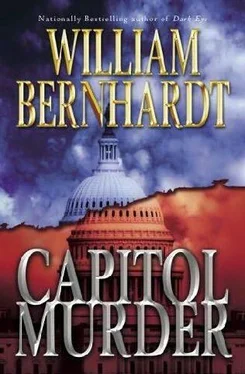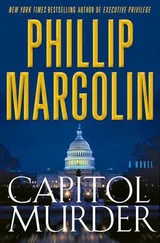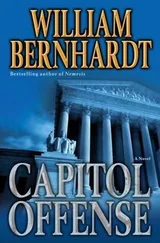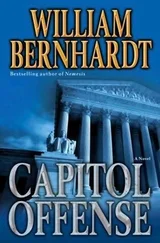“You’re just a counselor, Mr. Kincaid. An adviser. He can take your advice-or not. It’s his call.” He paused. “You know, my uniforms tell me there are about, oh, two billion reporters outside waiting to see what happens next.”
“What is that supposed to be?” Ben bellowed. “A threat? Blackmail? Any attempt to deny my client his Fifth Amendment rights is impermissible under Miranda v. Arizona and sanctionable by-”
“Yadda, yadda, yadda.” The lieutenant ignored him. “So what’s it going to be, Senator? Do you come clean, or do we go outside and inform the world that you’re not talking?”
Glancy paused, pursed his lips, exhaled heavily. It was obviously a difficult decision for him. “It goes against my every instinct not to cooperate with a legal inquiry.” He sighed. “But I suppose I have to respect my attorney’s experience in these matters and do as he says.”
“Have it your way.” He waved to his sergeant. “Senator Glancy, you are now under arrest on a charge of murder in the first degree. Sergeant Reasor, handcuff the man.”
“That won’t be necessary,” Glancy said.
“I’m afraid I insist.”
“Why?” Ben said. “Just to humiliate him on the six o’clock news?”
“Standard operating procedure.” He leaned into Ben’s face. “I gave you a chance to save face, wiseass. Now your man pays the price.”
“You’d already decided to arrest him. You were just trying to get a few pre-Miranda freebies and we both know it.”
The sergeant handcuffed Glancy, then pushed him toward the door and down the corridor.
“I can run interference for you,” Ben said, as they approached the swarm of reporters waiting at the top of the stairs. “Hold up a newspaper. Keep them from getting TV footage.”
“Please don’t,” Glancy said, and a moment later he had his television face on while a hundred bright lights shone down on him and a thousand questions were shouted at once. “This is all a terrible mistake,” Glancy said. “I intend to cooperate with the investigation fully, so we can find out who really committed this atrocity. And then I’ll be back to work, serving the best interests of my constituents, in no time at all.”
But even as he watched the man perform like the pro he was, Ben knew he was wrong. This wasn’t going away anytime soon. If it went away at all.
Part Two. The Judicial Evidence Is All-Embracing

*
WASHINGTON DC, FIVE MONTHS LATER
Ben thought he was beyond the point where anything that took place in, at, or near a courtroom could surprise him. After the trial in Chicago -an emotionally and politically charged hate crime, covered blow-by-blow by the media nationwide-what could possibly be more difficult? He thought he’d seen it all.
He was wrong.
The federal courthouse was swarming with reporters. That was hardly startling. The so-called Glancy’s Glen had established itself in the courthouse parking lot almost immediately after the senator was arrested. Scores of reporters representing all the media were there, making daily, sometimes hourly updates with the majestic stone pillars of the courthouse as a backdrop. According to the experts, the media stronghold outsized the famed O. J. outpost. Every pretrial proceeding, no matter how minor, had been covered in detail: every docket hearing, every pretrial motion, every judicial conference, no matter how trivial. The reporters would deliver their reports in somber tones, usually concluding with a small pivot toward the courthouse and a reference to how “no one would know for sure” what happened to Veronica Cooper until the parties gathered in this building “for a final reckoning.”
What did surprise Ben as he and Christina stepped out of their taxicab was how expertly the area surrounding the courthouse appeared to be organized this morning. Ropes cordoned off the central flight of steps leading to the front doors. There were protesters present, firebrands from the left and the right as there had always been, but somehow they had been pushed far to the rear, far enough that not even the loudest of them would be heard once the minicams started rolling. Ben recognized many of the people standing closest to the ropes-including several of the senator’s staff members and friends, such as Amanda Burton and Shandy Craig. A podium had been placed at the top of the stairs with several microphones already in place.
As Ben gazed at the assembly, Marshall Bressler rolled up beside him.
“Got to hand it to the DC authorities,” Ben said with genuine admiration. “They’ve got things much more under control than their counterparts in Chicago did.”
“Forget the authorities,” Bressler replied. “Congratulate Senator Glancy’s advance team.”
Christina raised an eyebrow. “What’s an advance team?”
“I can tell you haven’t had much experience with politics. These days, advance men-many of whom are women, by the way-are the lifeline of any politician. At least any politician who wants to be one for very long. Ever since Kennedy/Nixon in 1960, the need for specialists to orchestrate and control how candidates are presented by the media has been readily apparent.”
“I haven’t seen any advance men in the office.”
“We’re not talking about paper pushers. We’re talking about highly skilled media consultants who command top dollar-because they’re worth it. They pander to the press, marshal the allies, outwit the enemies, cozy up to the Secret Service, prepare itineraries, arrange photo ops, plan motorcades, hang bunting and banners and, most important, anticipate every contingency. Politics is not immune to Murphy’s Law-anything that can go wrong, will. The advance men deal with all unforeseen developments and overcome them.”
“And they did-” Ben waved his hand toward the general assemblage. “-all this?”
“Of course. Believe me, they’ve been working on it for days-obtaining permits, snuggling up to the courthouse officials, confabbing with Amanda and the rest of the staff on how we wanted our man presented. Remember, most people will be seeing Todd today for the first time in five months, ever since he was incarcerated in the district jail.”
“Your people put up these ropes?”
“Who else? They wanted to make sure the senator could make a dignified ascent, without interference. Why do you think all the protesters and right-wing tub-thumpers-some of whom were bused in from Maryland by the Senate majority leader’s staff, by the way-have been shunted off so far from the action? All the cameras will get are Todd’s supporters.”
“Is this really necessary? The potential jurors are already sequestered.”
“They’re not concerned about the jury, Ben. That’s your job. They’re concerned about the voters, and not just the ones back in Oklahoma, either.”
“Surely Todd doesn’t still think he can run for national office.”
“Our polls indicate that the video hurt us with female voters, but much less so with males, especially those under the age of forty-five. If you can make it look as if Todd has been the victim of political calumny, an unscrupulous plot to entrap him with another woman then frame him for murder, you might well win us back those female votes. Women sympathize with underdogs and martyrs-people they believe have been treated unfairly.”
“Speaking as a woman,” Christina said, “and for that matter one who doesn’t believe Senator Glancy killed Veronica Cooper, I still wouldn’t give the man my vote if he personally kissed my-”
Читать дальше









